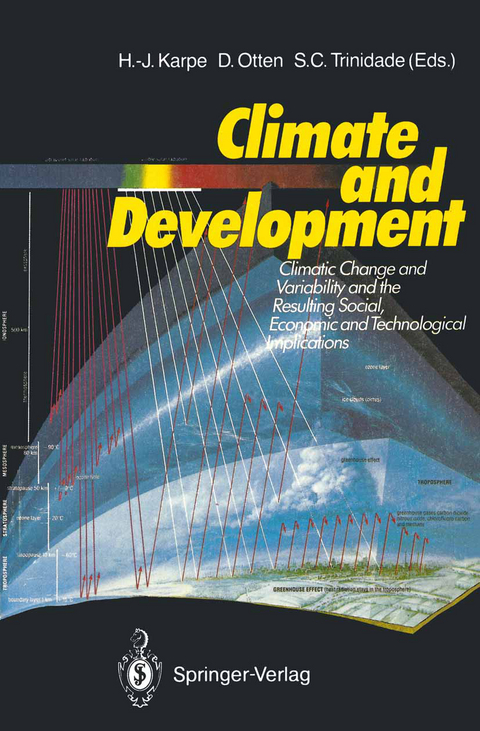
Climate and Development
Springer Berlin (Verlag)
978-3-540-51269-1 (ISBN)
1 Overview: Report of the Hamburg Congress.- The Highlights of Deliberations.- The Hamburg Manifesto.- The Hamburg Action Plan.- 2 The Larger Perspectives.- 2.1 Message of UN Secretary General.- 2.2 Opening Speech.- 2.3 Opening Lecture: Climate, Society and the Historical Development.- 2.4 Opening Speech.- 2.5 Statement.- 2.6 Environmental Degradation - a Threat to Development.- 2.7 Possible Policies and Options in the European Community to Respond to Climatic Changes.- 2.8 Political Perception of Climate Change: Still Chalk on the White Wall?.- 2.9 Climatic Change - Its Political Challenge to the International Community.- 3 The Scientists' Perceptions.- 3.1 Climate and Development: Scientific Efforts and Assessment - The State of the Art.- 3.2 Programmes and Co-operation in Climatic Research - a Means to the Understanding of the Climate System as a Requirement to Cope with the Climate Issue.- 3.3 To Limit and to Adjust: Some Human Dimensions of Global Climatic Change.- 3.4 Some Strategies of Response in Agriculture to Changes of Climate.- 3.5 Climate Variability, Climate Change and the Development Process in Sub-Saharan Africa.- 3.6 Modelling the Climatic Effects of Trace Gases: Reduction Strategy and Options for a Low Risk Policy.- 3.7 Contributions to the Atmospheric CO2 Increase by Changes in the Land Biosphere: Analysis of the Past and Present, Including Possible Future Developments.- 3.8 Long Range Strategic Concepts to Reduce Drought Damages to Agriculture.- 3.9 Energy Options and Climatic Effects.- 3.10 Anthropogenic Climatic Changes.- 3.11 Climate Change - Secular Trends in Urban Temperature.- 4 The Industry Point View.- 4.1 Industry's Attitude BDJ.- 4.2 Climatic Risks and the Role of Energy Use.- 4.3 A UNICE Perspective on the Greenhouse Effect.-5 Views of Non-governmental Organisations.- 5.1 Responding to Climatic Change: The Crucial Role of the NGOs.- 5.2 Strategies and Recommendations for the Protection of the Tropical Rainforests.- 5.3 Escaping the Heat Trap: Policies to Prevent Climate Change A statement at the Hamburg Congress.- 6 Concerns of Developing Countries.- 6.1 Social Impacts of Climatic Variations, a Developing Region's Viewpoint.- 6.2 Drought in the Brazilian Northeast: Some Features of its Socio-Economic Impact.- 6.3 Summary of Views of Developing Country Participants Statement at the Hamburg Congress.- 7 International Initiatives.- 7.1 Strategies to Respond to Climate Changes - the Role of International Organisations.- 7.2 Climate and Development: Agricultural Practices and Water Resources.- 7.3 Climate Change and Human Health.- 7.4 Climate Change: Roles of UNESCO and IOC with Particular Reference to the Ocean.- 7.5 An Overview of International Developments, Trends and Actions.- 8 Where do we go from here?.- Where do we go from here?.- United Nations General Assembly Resolution.
| Erscheint lt. Verlag | 5.7.1990 |
|---|---|
| Zusatzinfo | XIV, 477 p. |
| Verlagsort | Berlin |
| Sprache | englisch |
| Maße | 155 x 235 mm |
| Gewicht | 760 g |
| Themenwelt | Naturwissenschaften ► Biologie ► Ökologie / Naturschutz |
| Naturwissenschaften ► Geowissenschaften ► Meteorologie / Klimatologie | |
| Technik | |
| Schlagworte | air pollution and air quality • biosphere • climate system • ecotoxicology • Environment • Greenhouse Effect • Rain • Temperature • Water Quality and Water Pollution |
| ISBN-10 | 3-540-51269-1 / 3540512691 |
| ISBN-13 | 978-3-540-51269-1 / 9783540512691 |
| Zustand | Neuware |
| Haben Sie eine Frage zum Produkt? |
aus dem Bereich


